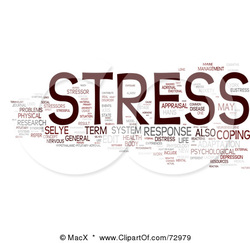
By Sarah Court
Exercise.com
When yoga was first created hundreds of years ago, practitioners didn't have the benefit of modern science to explain why it worked—they just knew it did.
Nowadays, we can look to science to help us understand how yoga gives us relief from stress.
What Happens When We Are StressedTo talk about stress, we have to talk about the hormone cortisol. Under normal conditions, your brain slowly releases cortisol into your body to make your muscles work. However, if you're highly stressed (late for work, deadline due, screaming baby: take your pick), your brain thinks there's an emergency and responds by flooding your body with cortisol.
If there really was an emergency, you would need this much cortisol to deal with broken bones, excessive bleeding, and so on. But if you're just stressed out by life, excess cortisol can lead to ulcers, high blood pressure, bone density loss, and can throw your immune system out of whack (why we get sick when we're stressed). It can also lead to weight gain because the body thinks it's responding to an emergency and so holds onto as much fat as it can.
READ MORE:
Exercise.com
When yoga was first created hundreds of years ago, practitioners didn't have the benefit of modern science to explain why it worked—they just knew it did.
Nowadays, we can look to science to help us understand how yoga gives us relief from stress.
What Happens When We Are StressedTo talk about stress, we have to talk about the hormone cortisol. Under normal conditions, your brain slowly releases cortisol into your body to make your muscles work. However, if you're highly stressed (late for work, deadline due, screaming baby: take your pick), your brain thinks there's an emergency and responds by flooding your body with cortisol.
If there really was an emergency, you would need this much cortisol to deal with broken bones, excessive bleeding, and so on. But if you're just stressed out by life, excess cortisol can lead to ulcers, high blood pressure, bone density loss, and can throw your immune system out of whack (why we get sick when we're stressed). It can also lead to weight gain because the body thinks it's responding to an emergency and so holds onto as much fat as it can.
READ MORE:

 RSS Feed
RSS Feed







